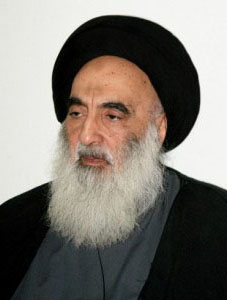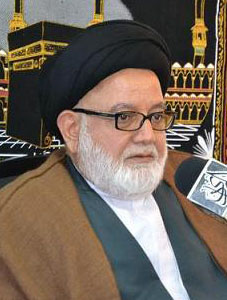Liaison office of Grand Ayatullah Sayyid Ali Al Sistani (L.M.H.L) in London, Europe, North and South America.

- Activities
- 9 Rabi'ul Awwal 1434H
The Supreme Marja’iyah’s recommendations to Allama Sayyid Kashmiri for Momineen in the West - when he visited the holy cities of Najaf & Karbala
As narrated from Amirul-Momineen Ali (a.s.) who said: The Messenger of Allah (peace and blessings be upon him and his household) told me: “Whoever visits [Ziyarate] a grave of our Ahlul-Bayt and dies the same year of his visit, Allah Almighty appoints seventy angles to praise him in his grave until the day of judgement [Qiyamate].
On the basis of the merit of this narration [hadith] Allama Sayyid Murtadha Al-Kashmiri had the honour of visiting the holy shrines in Najaf & Karbala (from 3rd to 7th Rabiul-Awwal 1423). Afterwards, he called upon the supreme Marja’ H. E. Ayatullah Al-Udhma as-Sayyid as-Seestani (long may he live) who was receiving his visitors, from an array of backgrounds and nationalities, daily from 10 to 12 am – greeting them and stressing on preserving the unity amongst themselves and that of their Muslim brothers without discrimination. Referring to the ways of the immaculate Imams (a.s.) and their virtuous narrations that emphasis on unity of Muslims regardless of their ideology or nationality, H. E. said: “This is the approach of the immaculate Imams (a.s.) in their interaction with people. They did not discriminate between one and the other because of his ideology, race or colour. We are their followers and must therefore emulate their approach so that our enemies, who want to sever our roots these days, cannot exploit us.” He also emphasized on the principle love between fellow believers – as one wishes for oneself.
Responding to those who asked him about how to deal with those who do us wrong by action and word, H. E. said: Firstly, you need to give them advice and guide them: (..and speak to them words of kindness and justice..). Secondly, to pardon them; applying the saying of the Almighty (...who restrain anger, and pardon (all) men;- for Allah loves those who do good). H.E. also emphasized on propagating the culture of love and friendship among Muslims, even to those who have done you wrong, because telling your Muslim brother that you love him will nurture love in his heart. Such was the holy Prophet (may Allah’s peace and blessings be upon him and his household) and the guided Imams of his household. This was their approach and that’s why they’ve prevailed all over the world and their history and constitution has remained a code for all humanity.
He also highlighted, to the delegates visiting him from abroad, the need to pay more attention to the upbringing of their children Islamically to ensure their happiness in this world and the hereafter, by saying: “They are in your trust [Amana] so do not be careless with them for you are responsible and will be held accountable on Qiyamate”.
He (long may he live) used to conclude his speech by saying: “Every morning I pray for all Momineen that Allah unites their word, puts affinity in their hearts, solves their problems, eliminates their worries and protect them from evil and harm.”
I asked H. E. why we see him referring to the practices of Shaykh Al-Ansari (q.s) so frequently? H. E. (long may he live) replied: “All our grand Maraji’ are good examples to be followed. In the forefront is Shaykh Al-Ansari for his piety and separation from this world in addition to his scholarly stature.” Thus H.E. (long may he live) wanted the Marja’iyah to remain as it was during the time of Shaykh Al-Ansari (q.s) to safeguard its charisma because it is the leadership representing the infallible Imam (a.s.). Therefore his opinion is that scholars should distance themselves from official positions because their stature transcends this. Their duty is to guide, educate and advise all Momineen. H. E’s involvement in Iraqi politics was only due to his awareness of the oppression and suffering of the Iraqi people who, for decades, were deprived of their most basic rights. H. E. considered it his Shari’ duty to do all he can to provide them with a decent and comfortable life – free and independent. We therefore heard him always saying: “I am a servant of the Iraqi people and glad to serve them, no difference between one and the other, they are all my children from all persuasions and denominations – defending the rights of a Kurdi as I defend the rights of a Basri and an Anbari. I have repeatedly stated ‘do not say our Sunni brothers but say ourselves’. They are all one nation and one Ummah from south to north and centre, every one of its citizens. That’s why the word ‘partitioning’ of Iraq into principalities, as planned for by the enemies, has never entered my mind and I shall stand against this plan very decisively insha-Allah. “
Yes, I did notice H.E’s obvious attention & reflection on the situation in Iraq and the Iraqi people and his minute by minute following of events in the country so that matters do not get out of hand, applying the method of his grandfather [the prophet]: “.O Allah You know that none of us are in rivalry over governance or seeking any worldly leftovers, but only to re-establish the knowledge of your religion and make reforms in your land so the oppressed of your servants shall feel secure and implement what has been in abeyance of your limits.”
Among the things that distinguish H. E. (long may he live) in his personal life, is that neither himself nor his sons own a house. Considering he has built tens of houses for Hawza students, orphans and those with low income in Najaf and outside. He established schools and named them in the eternal memory of prominent Ullema and Mujtahids in appreciation of their services to the religion – without even a mention of his own name. I also noticed he does not spend religious dues for his personal use; rather he manages by spending from gifts and donations but only after assisting widows, orphans and the needy. A businessman from Africa ‘Dar-es-Salam’ told me once when he visited H. E. and saw the modesty of his home, he signed an open cheque for him and told him: “write whatever sum you wish and buy a good house for yourself.” The Sayyid [Seestani] smiled and thanked him for his stance and said: “If you think of buying a house for all the poor in Najaf who do not own one, then let us be the last ones you think about, because I do not desire anything from the debris of this world for myself, rather I wish for what Allah has, for what He [Allah] has is good and eternal”. Bearing in mind the house where H. E. lives and its surroundings is Waqf for the Marja’iyah.
H. E. advised me to take care of the affairs of Momineen abroad and increase efforts to serve them and educate their children a religious education to safeguard them from straying away from their religion and principles, “for this is your responsibility and that of their parents. Hoping this Hadith shall not apply to them: Woe to the children of the end of time from their parents. From their Mushrik parents? They asked. No, from their Muslim parents who do not teach them their religious obligations and if they themselves learn, they [the parents] will prohibit them, being content with the minimum of this world for them; therefore I have nothing to do with them nor they with me.”
H.E. (long may he live) emphasized on the propagation of the sciences and culture of Al-e-Mohammad in these countries so their inhabitants will be aware of the sublime nature of Islam and its lofty statue. H.E. said: “Show them its merits and tolerance and its spread of love and peace. Be close missionaries not distant loners. Be emissaries and propagators of Islam with your manners, trustworthiness, devotion and piety and remember Allah, Allah will remember you (And say: Do [what you do]; Allah will see your deed, as will the Messenger and the believers...) Holy Quran, Tawba:105
Sayyid Kashmiri also met with the Imam of the Hussaini shrine and discussed the Arbaeen pilgrimage season with him. By the grace of Allah the Arbaeen pleased most Muslims with its organisation and numbers - exceeding previous years despite the terrorists’ attacks and infiltrations. He thanked him for the efforts of the Hussaini and Abbasi shrines in serving the pilgrims and hoped that some practices that appeared this year, contradicting the rites, will not be repeated in future.
He also met with the scholar Shaykh Dhia Zainul-Deen who is in charge of the Alawi shrine [in Najaf] and who expressed his willingness to collaborate with the Representative of the Marja’iyah in his constructive guidance and advice to Momineen in the west, linking them with the Alawi shrine’s projects, in order to consolidate their faith and conviction of the path of Imam Amirul-Momineen Ali Ibn Abi Talib (peace be upon him).

